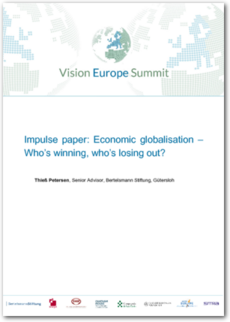Impulse paper
Vision Europe (ed.)
Petersen, Thieß
Economic globalization – Who’s winning, who’s losing out?
- Format Type
- Date of publication
- 08/11/2017
- Edition
- 1. edition
- Volume/Format
- 42 pages, PDF
Format
-
PDF
Price
Free of charge
Description
Two main consequences have arisen from the increasing cross-border exchange of goods, labor, capital and technologies: A better distribution of scarce production factors, resulting in positive growth effects for the economies of all countries involved. On the other hand, there have been changes in scarcity conditions within the individual economies. This leads to price changes in each country – both for material goods and services, as well as for the production factors of labor and capital. As a result, there are winners and losers of globalization within each country.
In advanced economies, the international division of labor and the associated cross-border trade activities lead to an increase in gross domestic product (GDP) in all of the economies involved. If real per capita gross domestic product is taken as an indicator for globalization-driven growth, then it is the advanced economies such as Japan, Switzerland, Finland, Denmark, Ireland and Germany that benefited the most from advancing globalization between 1990 and 2014.
In emerging and developing countries too, there has been a positive impact on growth from advancing globalization. In particular, these effects are reflected in the steep reduction in absolute poverty in Asia, South America and Eastern Europe. By contrast, for the least developed economies in Africa, the results are less positive when the pros and cons of globalization are weighed up. The gap in per capita GDP is widening between Africa and the rest of the world – not only in absolute terms, but also in relative terms.
At the same time, market processes of economic globalization produces losers as well as winners within every country. In advanced economies, it is workers who lose out, in particular the low-qualified and those employed in industries which are competing particularly intensely with emerging countries (especially China and Eastern European economies). In emerging economies, the relative scarce factor (capital) suffers from a lower demand.
This means that although the advancing globalization and international division of labor has increased growth in advanced economies, criticism of globalization has increased considerably in these countries over recent years.
The deciding factor for how globalization should be shaped in the future is whether the dividends of globalization can be distributed in advanced economies in such a way that globalization’s losers can also benefit from the resulting gains in growth. This requires policies that reduce income inequality and strengthen the social security systems, in order to alleviate citizens’ fear of change. In addition to compensating for lost income, it is also important to implement further training for the unemployed in order to facilitate their transition into sectors which have benefited from globalization.
A cross-society consensus has to be struck on how exactly these policy instruments should be designed – both in terms of expenditure and in terms of income. This consensus must take into account unintended effects and reciprocal effects as well. However, in the first instance, the deciding factor will be a fundamental commitment across society to place more focus in policy-making upon those who have lost out under globalization. Unless we compensate them, there is the threat of serious social and political tensions, which will threaten prosperity across the entire economy.




